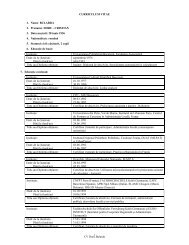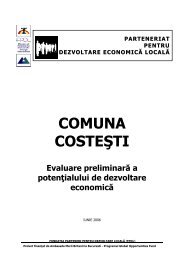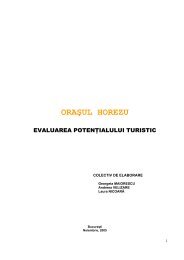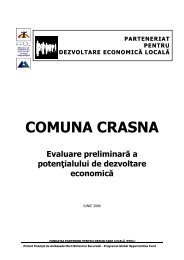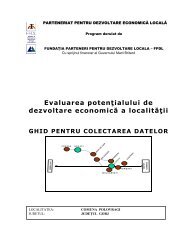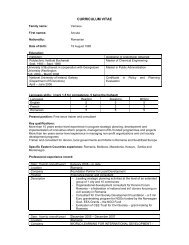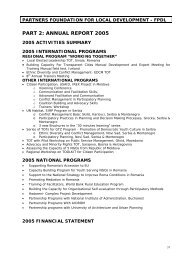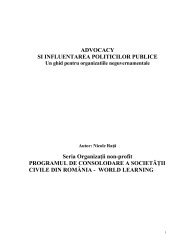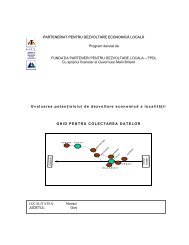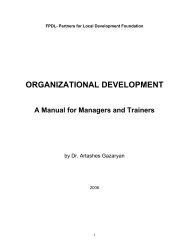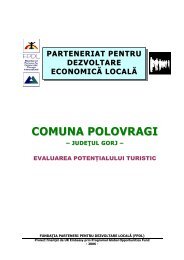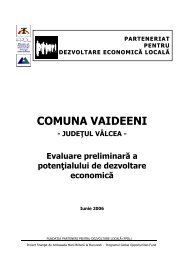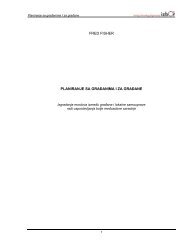analysis of the training process reviewed by the trainers on issues such as the change in thelevel of participants based on the questions, debates and discussion.These results are detailed and interpreted below:• A total of 105 hours of training were delivered• The importance and pertinence of the training topics to Burundi’s context was ranked bythe participants at 8.98 (out of 10.00)• The applicability of the training knowledge in daily life was ranked by the participants at8.70 (out of 10.00)• Participants’ knowledge and understanding of leadership was increased (qualitativeindicator). During the six trainings, each session on leadership had to be extended due toparticipants’ substantial interest on the topic, which was based on the latest field researchby Harvard University. The participants actively discussed their own experiences inleadership, and drew lessons and key points for further ways to improve their skills andknowledge in this area.• Participants’ knowledge and understanding of conflict was increased (qualitative indicator).The group dynamic during this topic was particularly high: each participant was activelyinvolved in exercises, plenary analyses and intense debates. The participatory methodologysupported and stimulated overall participation. The wrap-up at the end of each session,which permitted final questions and clarifications, indicated high levels of understandingand improved knowledge for each specific conflict-related topic.• Participants gained skills in using specific conflict analysis tools (qualitative indicator).Thisparticular session was very interactive, at each stage throughout the conflict analysis. Theparticipants worked in groups on the case study of Liberia, and then presented, avidlydiscussed and reached a comprehensive consensus on the overall results. The activeparticipation during the session indicates excellent results as well as increased skills inconflict analysis tools.• Establishment of an informal network of women leaders aiming to support the peaceprocess in Burundi through conflict resolution strategies.• The 140 participants elected 30 representatives to expand discussions around theopportunities, challenges and actions to develop a new informal network. A meeting withthe women leaders’ representatives (including representatives of the lawyers andparliamentarians) is tentatively scheduled for 4-5 weeks after the training.ALTERNATIVE DISPUTES RESOLUTION TRAININGDate and venue: May 25-29, <strong>2009</strong>, Bujumbura, BurundiTrainers: Olivia Baciu, <strong>FPDL</strong>, who worked together with Juliette Kavabuha, Head ofWomen Component, USAID ProgramParticipants: 30 Women, Members of Burundi Parliament, out of which 20 womenwere deputies and 10 were senatorsObjectives: Promoting women leaders in conflict resolution through providing themwith techniques and alternative resolution methodsProgram description: The 3-day session was based on practical approach to adulteducation, included concrete examples relating to conflict management and casestudies to identify strategies to overcome challenges in the field of conflictmanagement.Evaluation: Participants very well received the program and highly appreciated theinteractive approach. The results of the training are in both quantitative and qualitativeformats, from the interpretation of the training evaluations completed by the participants, aswell from the analysis of the training process reviewed by the trainers on issues such as thechange in the level of participants based on the questions, debates and discussion.These results are detailed and interpreted below:• A total of 18 hours of training were delivered• The importance and pertinence of the training topics to Burundi’s context was ranked bythe participants at 8.48 (out of 10.00)30
• The applicability of the training knowledge in daily life was ranked by the participants at8.32 (out of 10.00)• Participants’ knowledge and understanding of leadership was increased (qualitativeindicator)• Participants’ knowledge and understanding of conflict was increased (qualitative indicator)• Participants gained skills in using specific conflict analysis tools (qualitativeindicator)ADVANCED TRAINING FOR WOMEN LEADERS IN BURUNDI IN ALTERNATIVESTRATEGIES FOR CONFLICT RESOLUTIONDate and venue: August 10-19, <strong>2009</strong>, Bujumbura, BurundiTrainer:The program was designed and conducted by Olivia Baciu, <strong>FPDL</strong>consultant and trainerParticipants:23 women attended the training program. The women were legal representatives,executives or active members in the civil society organizations.Objectives: The training had two main objectives:• By the end of the training, participants will improve knowledge and skill incommunication, facilitation, negotiation and mediation as alternative conflictresolution strategies.• To facilitate the exchange of experiences and good practices between theparticipants in the field of alternative strategies for conflict resolution.Program description:During the 8-day training the following topics were covered:• Communication modules focused on the elaboration of strategies to deal withthe obstacles in interpersonal communication in different organizational settingsand on increasing behavioral awareness on the importance and on the power ofthe visual elements in communication, mainly of the body language.• The facilitation module focused on the role and skills of the facilitator and howto deliver effective group facilitation processes through two simulatedfacilitation sessions.• The negotiation module focused on the stages of a principled negotiationprocess, on what a negotiator should do inside each stage and how he shouldinteract with the other party in a way that do not damage the relationship and,in the meantime, which generates solutions satisfying both parties involved.• The mediation module was mainly a skills building module. The participantswent through all the stages of a mediation process, in a group mediationsimulation exercise, which built on a complex case study and allowedparticipants to internalize rich lessons on the role and abilities of the mediatorand on various complex aspects of the mediation process.Evaluation• The program was very well received by participants.• Overall, the applicability of the training knowledge in daily life was ranked bythe participants at 9.38 (out of 10.00)• Overall, the importance and pertinence of the training topics was ranked by theparticipants at 9.35 (out of 10.00)• Participants gained in-depth knowledge of communication as a key strategy tosettling conflicts peacefully and as transversal essential skill, which supports allother alternative strategies for conflict resolution. Participants developed theirknowledge and skills on elaborating strategies to deal with the obstacles ininterpersonal communication in different organizational settings and increased31



